Shipping, simply put, is the physical movement of goods from point A to point B. It can be referring to something as simple as an item being shipped to your door from your neighboring city, to tons of goods being moved halfway across the world. There are of course various modes of shipping, intricacies of the movement itself, and a variety of complications that can arise. The term ‘shipping’ was once solely used to refer to transport by sea, but now the meaning often extends to include many different modes of transportation, and often intermodal transportation, which refers to various different modes being used in the process of transporting goods. These may be utilized independently or combined for a single consignment, depending on the type of goods and where they’re being shipped.
Let’s take a look at them individually.
Ground Shipping:
Ground shipping tends to consist of small or medium sized groups of your everyday goods that are more often than not shipped within one country. It is a convenient and cost efficient means of transport, consisting of large trucks driven by professional drivers. However, with larger goods going longer distances, the option can be found lacking.
Rail Shipping:
Rail shipping, which consists of goods being transported by rail, usually caters to larger goods. It deploys both rail and road services, but is not as often utilized as others, as it’s mostly limited to distances within a country, and other modes such as air are more time efficient for goods in smaller sizes.
Air Shipping:
Air shipping is the most efficient way of transporting small-to medium-size amounts of similarly sized goods as far as time is concerned. Special Freight Planes are used in the process, and these goods can be transported all over the world via daily cargo flights.
Sea Freight Transportation:
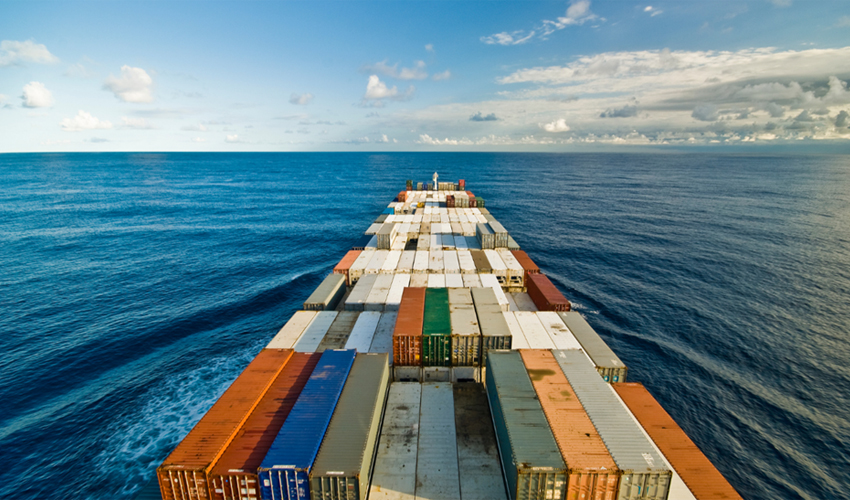

For bulk goods or large volumes that are to be moved over longer distances, and across countries, sea freight transportation is best. Ships are deployed solely for this purpose and the goods are secured in containers so as to move them safely from their point of origin to their destination.
Of course, whilst this can sound relatively easy, a complex underlying process exists, with various impediments needing to be dealt with, especially when shipping globally. The intricacies and some of the parties involved in global shipping include:
- The shipper and the consignee are in layman terms, the sender and receiver of the goods. The shipper needs to prepare the goods, verify the relevant documents, confirm the licenses and deal with the other parties involved in the shipping process to move the goods to the consignee. The consignee or the receiver, in cases of global shipping of cargo, needs to be physically present and deal with their share of documents so as to receive the cargo.
- The shipping company is the owner of the vessels required for transporting the goods, and are usually contacted when a bulk of goods are to be sent over large distances.
- The carrier is the shipping line that does the transporting of the cargo from location A to location B. They are responsible for the handling of the goods and their containers are used in the process of shipping.
- Custom agents often handle the legal formalities of the clearance of customs, as is often required for goods sent internationally.
From a business perspective, one may initially resort to cut costs by handling shipping themselves but the procedure to be followed and the intricacies of shipping makes it difficult for one to do so and once the business venture grows, it’s no longer feasible or economically viable to handle the shipping of goods themselves. In such a circumstance, it’s in their best interests to seek the services of a shipping or a global shipping company.
Global Shipping Companies
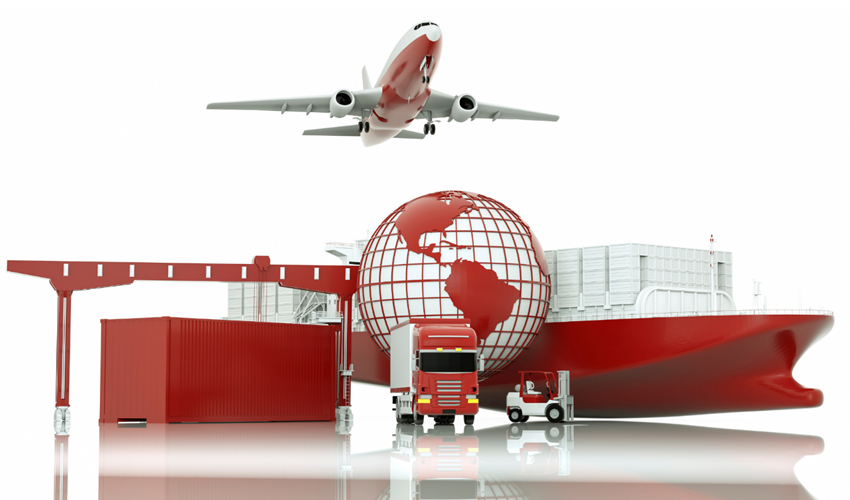

Global Shipping Companies are pivotal to the process of shipping and are often required by businesses and individuals who want to avoid the difficulties associated with the lengthy and extenuating process of shipping, and to save time and energy in the process. Global shipping companies play many roles and are a key link between the many different entities working to get goods to their destination. These companies are no longer simply a fleet of transport vehicles but rather a sophisticated logistics provider with shipping services of many different types and handling a multitude of processes from transportation to the management and storage of goods.
They also handle the communication between different parties and the coordination and confirmation of deliveries. They make sure that the entire chain functions optimally as an integrated whole, whilst providing cost efficiency and solid customer service. The management of this requires the optimal use of networks and ideal communication from the suppliers, senders, manufacturers, warehouses, etc. so that every step of the shipping process is done in the most efficient and successful way possible.
A huge benefit of engaging these global shipping companies include saving time and avoiding unnecessary costs, such as hiring staff, purchasing vehicles and maintenance. Often, in managing a global supply chain, companies are required to follow a process of conforming to hundreds of laws and for this fact alone, it’s always advised to employ the expertise of these shipping companies.
There are other important factors to consider when deciding whether or not to use an experienced logistics/shipping company, which include:
- Documentation


In global shipping, one of the most difficult processes is confirming the legalities and documentation of goods to be shipped. This is because each country has different export requirements and documents for different types of goods to ensure the legal safety of the sender as well as the receiver. Permissions, declarations, etc. are required, which are all handled by a global shipping company as their legal teams draft and arrange everything necessary for this process to go as smoothly as possible.
- Shipping Services
Ocean or international shipments consist of various procedures from the transit to the clearance that are all efficiently handled by global shipping companies. In the cases of bulk shipping by sea, various different containers are arranged depending on the type of goods such as:
- Full Container Loads (FCL):
FCL refers to shipments in which goods in a container are owned by a single party.
- Lesser Container Loads (LCL):
LCL refers to multiple good from various shippers packed together.
- Reefer containers:
Reefer containers are containers that involve the transport of temperature-sensitive cargo, due to which they’re refrigerated.
- Out of Gauge (OOG):
OOG goods are goods in bulk that don’t fit in standard containers and therefore require modification.
- Flat rack containers:
Flat rack containers, not too dissimilar in purpose to OOG containers, are containers that only have walls at the short ends. This proves to be of utmost importance when cargo needs to be loaded from the sides or from the top due to their irregular dimensions.
Bearing in mind the challenges posed by international shipping, which include the heaviness of the cargo, the security considerations of the shipping, protection of said goods and so on, these containers make handling, including loading and offloading, as easy and safe as possible.
Furthermore, in successfully delivering the consignment to the receiver, often intermodal deliveries are required where various different modes of transport are arranged by the companies.
- Customs and Duties
Customs clearance is pivotal when it comes to international shipping and the movement of goods from a country to another. Global shipping companies not only know the ins and outs of custom regulations of different countries, but also strive to stay on top of any and all changes and updates in regulations. They are, as a result, poised to efficiently handle tasks such as arranging and managing the paperwork, paying all the relevant duties for the goods to be moved and keeping clients informed throughout the process.
- Storage
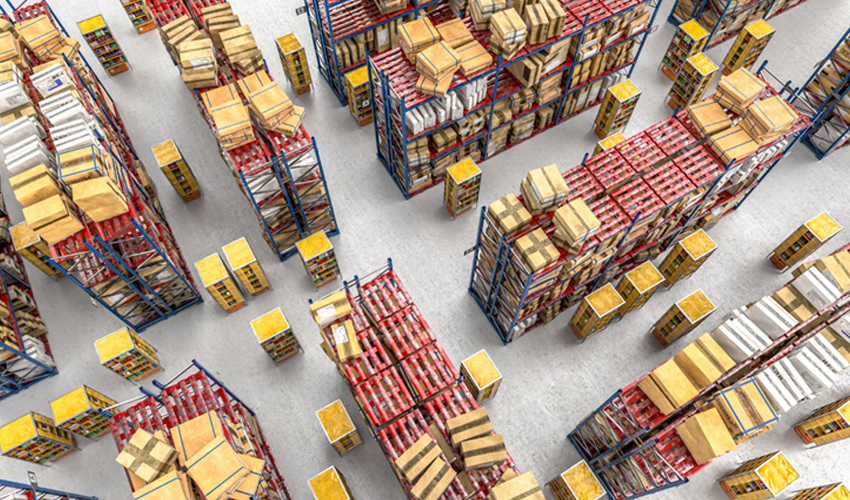

Modern global shipping companies, along with notifying and keeping you aware at every moment as to where your consignment is, also manage the storage of goods in warehouses. To ensure proper storage of goods, global shipping companies are increasingly integrating technological solutions into their storage procedures and protocols. Most shipping companies and services now deploy computerized systems that track incoming consignments and automatically assign the correct spaces, and make sure that the warehouses used, include services that cater to the customers and the safety of their goods.
- Outbound Procedures
In an attempt to cut costs, some shipping companies tend to slack off when it comes to ensuring efficient execution of outbound procedures. This, however, ends up costing them in the long run. Proper and careful execution of outbound shipping processes including packing, checking and loading of goods is crucial in ensuring the quality and safety of goods.


Experienced, global shipping companies understand this and refuse to compromise on any part of the supply chain. When it comes to the last leg of shipping, they make use of nuanced and often state-of-the-art procedures to ensure smooth shipping and deliveries.
Evolution of Global Shipping
Outsourcing transport and shipping is an increasing trend worldwide. Using such global shipping companies can be vital to saving a business’s time and costs, as they can handle every detail pertaining to the process of shipping. This increasing reliance on global shipping companies can be attributed to multiple factors, including:
Globalization
Since the turn of the 19th century, the world has become more connected and has collectively advanced at an accelerated pace. With the onset of the industrial revolution came rapid development of modern technology, a continued rise in global population, and a substantial increase in consumerism, all of which have given way to globalization.
Economies around the world have been experiencing spectacular growth which has led to average household incomes reaching newer levels by the year, consequently increasing the demand for higher quality goods. Domestic production in countries has long failed to meet the demand of the local economy, and global trade has flourished as a result. Globalization has, therefore, given rise to demand for quality B2B and B2C global shipping services.
As more and more businesses start operations in multiple regions, and global economies become more integrated as a result, the importance of the global shipping industry continues to rise. We have now reached a point where global economic prosperity relies heavily on consistent and smooth global shipping operations.
Modernization of Shipping


Malcolm McLean’s original container had a capacity of 226 twenty-foot equivalent units (TEU), which is a standard unit used for the measurements of such containers. Scientific developments and the competitiveness of the shipping industry has led to the largest container ships now transporting over 20,000 TEU containers of good around the world at once. Moving billions of dollars of goods per shipment create huge economies of scale, which further allow companies to lower consumer prices. Ships have also increased in size, and due to these huge vessels, shipping costs have reduced. Speed has also substantially increased due to the invention of the screw propeller for ships, while aeronautical developments have led to air freights being more convenient and cost efficient than ever. The designs of air and ocean freight have also changed radically, reducing costs and fuel consumption and boosting the safety of transport and shipping at the same time, while specialization of different modal transports has further promoted the growth of the shipping industry.
Automation in Global Shipping
There are various automation techniques that have been introduced in shipping, which include, but aren’t limited to, self-loading/unloading systems, computerized navigation, and the Global Positioning System (GPS). Automation has led to a substantially smaller number of crew needed and at the same time conforms to the safety standards set out worldwide. This also leads to a further decrease in costs, increase in shipping and more efficient work overall. Shipping companies that embrace automation are, therefore, able to take on a higher workload, expand their operations, and compete on a global level.
Future of Shipping


The shipping industry has come a long way in recent decades. It has grown into a huge and complex industry where global shipping companies are constantly striving to become cost-effective and gain strategic competitive advantages in order to meet the needs of today’s commercial marketplace while also ensuring financial success.
The industry has also not been a stranger to technological disruption and has had to adapt to modern times and adopt forward-thinking, tech-driven business practices. With advancements in technology rolling out at a rapid pace, and a rapidly changing market (especially in light of the Covid-19 pandemic), the global shipping industry needs to continue to evolve and adapt the way it does business in the coming few years.
Here are some trends that give us insight into the future of the global shipping industry.
- Further Technological Advancements
With continued technological development the future of global shipping will see much more scientifically sophisticated techniques of shipping. Warehouses and other storage mediums are expected to further evolve, such as automatically identifying and catering to goods’ storage requirements. Furthermore, transport vessels such as ships and planes will have better networks of sensors pertaining to all aspects of operations, and will hopefully even detect and fix/maintain areas that need it. Better vessel-to-land operations will also eventually result in operations primarily conducted by a land-based team.
Some Global shipping companies have already started to embrace artificial intelligence and predictive data analytics to strengthen their supply chains, forecast market demand, predict market shifts, and develop their overall business strategies. In coming years, we will see data analytics play a larger role in the streamlining of global shipping operations and increased automation of shipping business processes to boost efficiency.
Development in A.I. technology has also caused excitement with the prospect of autonomous shipping. In fact, the first un-manned shipping vessel is set to sail this year and its success is set to open the door to further research and development.
The benefits of tech-driven shipping operations will ultimately be passed on to the final consumers and businesses in the form of lower costs, timely deliveries, increased safety of their goods, and greater efficiency overall.
- Bigger Shipping Services
Improvements in transport technology and structure will lead to even bigger ships, planes and better designed trucks. Manufacturers, owing to lower transport costs, will also potentially be able to invest in better production methods, improving their products and thus resulting in even more orders.
- Greener shipping
The worldwide trend and pressure of decreasing the carbon footprint has led many ships and other modes of transport to include technologies that use low carbon fuels in order to positively impact the environment.
Shipping companies are looking to make the switch to renewable energy sources to power their marine and land transportation fleets. For example, solar and wind power are being tested for their effectiveness in making transportation via sea more sustainable. The shipping industry is also committed to reducing its dependency on oil and is testing greener fuel alternatives. Liquified natural gas (LNG) is one alternative that is expected to gain mass adoption in the future. Use of LNG promises a reduction of around 25% in CO2 emissions.
As the world moves away from fossil fuels, arguably the greatest challenge for the industry is reducing its reliance on fossil fuels and incorporating greener technology.
Logistics and transport companies form an integral part of a business’s supply chain. Depending on the requirements, logistics support can range from freight brokerage/forwarding to third-party and fourth-party logistics services—where an organization’s core functions are also managed by an outside provider. As well-handled logistics can potentially change the operational efficiency and overall profitability of a business, it is essential to undertake a thorough vetting process before entering into a contract with a partner.
If you are looking for a logistics company in Saudi Arabia to help with your freight, transportation, warehousing, and inventory needs, you need to ensure that you find a trustful and reliable logistics collaborator with whom a long-term business relationship can be built.
This article will highlight what you need to know so that you can make an informed decision.
Things to look for in a professional logistics company in Saudi Arabia
The freight and logistics market in Saudi Arabia is going through a period of ambitious expansion with a CAGR of 7.35%. This means that there are a lot of new players in the market advertising features and qualities that they may not be able to deliver on and execute. That is why when you are researching for a logistics company in Saudi Arabia, you need to look beyond the tall claims and marketing hype to find a professional partner.
There may be a lot of names that pop up when you look for logistics support in the Kingdom but finding one that meets your needs and offers customizable solutions is not an easy task. It’s challenging and time-consuming work and there are not many logistics providers that can offer seamless supply chain support as well as meet your budgetary requirements. Not only do you need to find a company that takes care of your goods and products, but you also need an organization that has Saudi, regional, and international logistics experience.
You must partner with a logistics company that has a wide network of international and regional transportation, warehousing, and logistics options. That is the only way a logistics firm can activate both local and international networks to mitigate the impact of disruptions to your business.
Listed below are five things to keep in mind that can help you differentiate between a good Saudi logistics company and someone claiming to be one:
- Logistics experience in the industry:
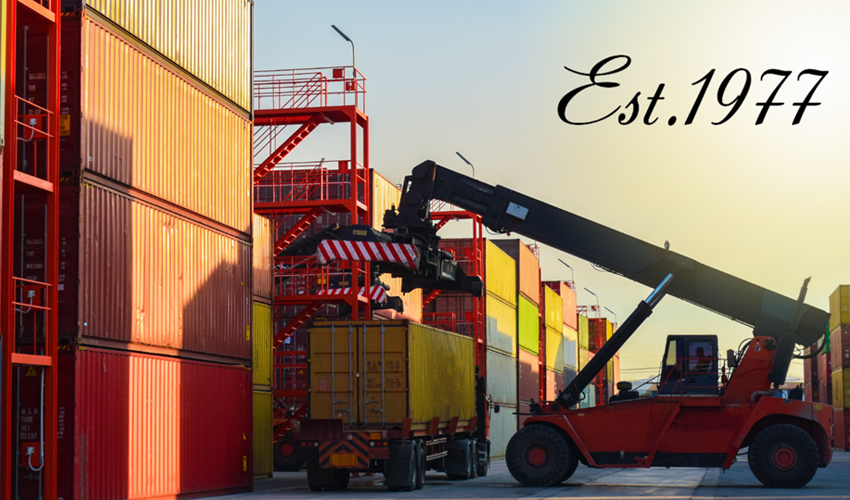

Logistics management is both an art and a science. A professional logistics company in Saudi Arabia works in a way that optimizes inventories and route management through advanced systems. From years of working in the Kingdom, they have also established well-equipped, connected logistics networks across wide territories. This familiarity with markets places them in a better position to handle disruptions with out-of-the-box solutions and alternative arrangements.
What’s more, as a logistic company develops integrated value delivery chains, its portfolio of services expands to meet the needs of its clients—winning it not only repeat business but also brand value. It’s important to remember that not every logistics company in Saudi Arabia can make these critical processes work for themselves and their customers. It’s good to keep in mind that poor logistics can reduce customer satisfaction and seriously impact your finances.
- Logistics in Saudi Arabia—number of services offered:


Supply chain efficiencies are paramount for the optimal functioning of an enterprise. Businesses rely on efficient logistics processes to operate lean management methodologies, deliver value to customers, and remain competitive in the market.
A transportation and logistics company in Saudi Arabia that offers a wide range of services is a much more reliable option for an organization with a future-oriented approach. A logistics company that provides a wide range of services on a single platform can also meet a client’s demands to scale to their business model. Moreover, when a logistics company is involved across multiple players in the supply chain, it can reduce inefficiencies by identifying areas of delay and mismanagement.
What’s more, a logistics company in Saudi Arabia that offers consultancy services is better placed to improve managerial decision-making processes in a client’s business. Similarly, a vast, well-equipped, and connected freight network built through heavy investments of capital and labor can provide integrated logistics support to an organization’s import export functions. To ensure that you have reach across all parts of a country, logistics companies also need to have hubs near ports and inland territories. SBT, an established logistics company in Saudi Arabia for example, has a presence not only in the main cities of Riyadh and Jeddah but also operates hubs from Jizan, Khobar, and Sakakah. It also has a wide network of port and inland warehouses, as well as transportation infrastructure at its disposal that can service every nook and corner of Saudi Arabia. These resources help SBT adjust and improve each link in the supply chain to provide a business seamless support. By employing a combination of sea, air, and land freight options, powered by the latest technologies, SBT ensures that customers’ goods arrive when and where you need them.
It pays to remember that these competencies cannot be substituted because they are developed and strengthened over years of market familiarity and experience. That’s why, when you are making a decision it’s important to choose a logistics and transport company that can scale to cater to your business’s needs. This consideration is especially important for growing organizations that need partners who can envision their future needs before they are manifested.
- Logistics in Saudi Arabia—a commitment to customer service:


A commitment to customer service is one of the key features that businesses should be looking for in their logistics service provider. An arrangement with a logistics partner is a long-term decision, the consequences of which will invariably have a lasting impact on your enterprise. It is imperative, therefore, that your logistics company in Saudi Arabia be on the same page as you. As a business owner, you do not want to be contractually bound by an arrangement that fails to meet your changing requirements. You want a logistics partner that values your needs and responds just as well to your apprehensions.
That’s why, regardless of the size of your business, a reliable and reputable logistics company in Saudi Arabia needs to offer assistance 24/7 and answer queries as they arise. Whether you are a new shipper who needs a large number of goods delivered or you are a seasoned client with questions about a shipment, you need to know that your logistics partner can provide complete transparency and accountability.
One good way to ascertain this is to look for client testimonials. As a part of your market survey, you may also want to find out what areas of logistics services a company specializes in and then reach out with questions. How quickly a logistics company gets back to you will also give you an indication of their work ethic.
- The reputation of a logistics company in Saudi Arabia:


As we’ve mentioned early, logistics in Saudi Arabia as a sector is going through a phase of serious expansion. With Vision 2030 encouraging heavy investments in infrastructure, construction, and development, there are a lot of new players in the market. That’s why when you are looking for a logistics partner, one of the most important factors to keep top-of-mind is the reputation of the logistics company you plan to hire. It is important to understand how established they are in the market and how much experienced they have in meeting client needs. More importantly, you need to review how they are regarded by both peers and customers in the industry.
A reputable logistics company has to have an irreplaceable wealth of knowledge that enables them to anticipate unexpected hurdles and plan for contingencies. It also places them in a better position to think ahead, activate alternative networks, and manage the safe and timely movement of goods to meet client deadlines.
To be able to judge the reputation of a prospective partner, find out about a company’s experience handling logistics for a business similar to yours. Their feedback will give you better insight than any advertisement or marketing. You may also choose to ask industry peers about the range of their logistics’ providers expertise, responsiveness, transparency, integrity, and truthfulness. Keep in mind that in competitive markets like Saudi Arabia, well-established logistics and transportation companies take years to build their reputation. There’s no price for this experience. If you are an organization with a long-term view you want a logistics partner that knows not only the ins and outs of the Kingdom but also understands the business environment and mindset of operators and network providers in the country.
- A logistics provider’s infrastructure and technological savviness:
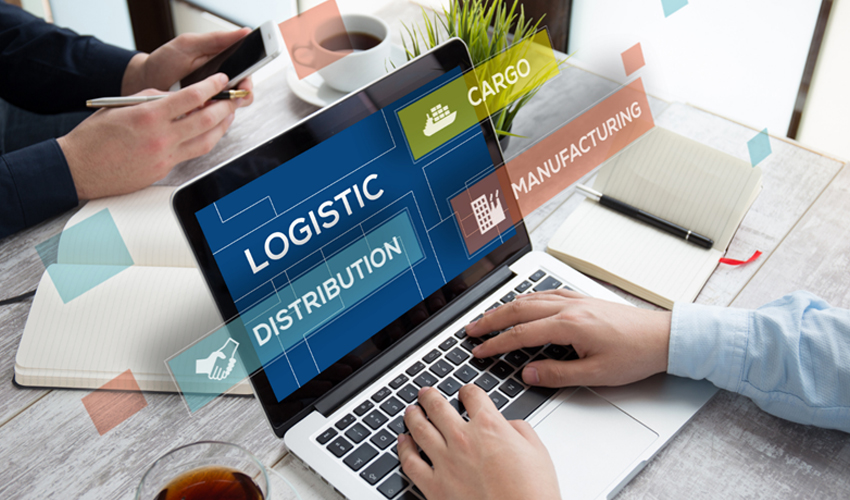

In today’s digital environment, clients demand 24/7 accountability and traceability of their goods and products. A professional logistics provider has to be technologically adept so that it can cater for real-time tracking and visibility along the supply chain. It needs to offer digital integration not only with its client’s processes but also provide additional warehouse management systems (WMS) and enterprise resource planning (ERP) structures so that you can keep ‘eyes’ on your goods from beginning to end.
What’s more, as most transactions and interactions with all players along the supply chain occur digitally, your prospective logistics partner also has to be technologically savvy so that it can conduct business effectively.
Forward-thinking logistics companies in Saudi Arabia like SBT are already incorporating digital devices, machine learning, and IoT into their logistics functions so that they can optimize operations and reduce inefficiencies. When a logistics providers’ processes become increasingly streamlined through digital implementations, it can pass its cost benefits to you to make the movement of goods considerably cheaper. Processes like advanced shipment tracking, for example, can give you more visibility over the status of your shipments. This helps you better plan your other operations accordingly to ensure that you meet timelines.
Benefits of selecting a reliable logistics partner


The right kind of logistics partner can make or break your business. Logistics in Saudi Arabia is poised to grow exponentially as a sector as the country becomes a dominant player in the market. With a professional third-party logistics partner, you can simplify your supply chains, optimize warehousing, and prioritize packaging to ensure lower costs and a smoother customer experience.
Listed below are some additional benefits of partnering with a reliable logistics company in Saudi Arabia:
Innovation: When your business enters into a relationship with a reliable and competent logistics firm, no part of the supply chain is left unattended. This is especially true for 3PLs and 4PLs as they bring constant improvement to processes by identifying areas of improvement in need of innovation.
The global marketplace is fiercely competitive, and businesses constantly need to innovate to grow their market share to ward off threats of obsolescence. This is where 3PLs and 4PLs come in—they are companies whose entire business model is to understand areas of weakness to streamline inefficiencies and optimize processes. They improve clients’ supply chains and enhance the logistics experience to deliver quality services. By innovating, a professional logistics company in Saudi Arabia can provide greater flexibility on deliveries as it integrates newer and more durable technologically powered solutions to provide faster and more reliable data to its customers. This data can then be used to analyze trends to identify areas of improvement. These processes help cut costs without compromising on service.
Flexibility:


Good logistics companies in Saudi tend to market themselves based on industry expertise. However, it is important to remember that there are key differences in operations even while there are similarities in pricing and distribution strategies within an industry. Each business is unique, and a qualified logistics company can tailor its supply chain solutions to meet your exact organizational needs and objectives. Moreover, a professional logistics provider can also mold their offerings to suit existing business processes in your company. That’s why when you undertake a long-term arrangement with a reliable logistics company in Saudi, both small and medium enterprises have the flexibility to scale up or down to meet requirements. Your logistics firm can help you meet any expected increases and/or decreases in product demand patterns as and when they arise.
Moreover, good logistics firms have an informed game plan for how they intend to achieve more with less, and how they can pass on those savings to you. An experienced logistics company in Saudi Arabia will have in-house services as well as networks managed by subcontractors and other small local carriers or entities. In the event of any disruptions, it’ll be far better placed to activate these channels in the supply chain and can easily meet requirements through real-time flexibility and agility. You want this experience on your side if you hope to grow as a company. A logistics company like SBT that has local experience in Saudi will be capable of responding quickly to offer quick and effective solutions to a customer’s-specific situation or changing regulatory requirements.
Risk Management:


Partnering with an experienced and reliable logistics service provider can help businesses mitigate risks that are inherent to the transportation of goods. A good relationship with your logistics partner entails having designated points of contact for scheduling loads and receiving information. A 3PL company that values customer service can greatly reduce confusion and apprehension on the part of the shipper through swift responses and detailed engagement with customer inquiries. When you have a 3PL working for you, you don’t need to worry about the safety of your freight as these logistics firms have strict standards for carriers (based on safety scores, track record, insurance, and customer preferences).
While pricing can influence your decision-making and selection process, it is important to remember that you can’t afford to forsake quality and professionalism for lower prices. The cheapest option is not necessarily the right one. Compromising important features and services for a lower price point can have a detrimental impact on your supply chain to impact your product quality and customer satisfaction. The overall value, optimization, and efficiency that your logistics partner can add to your business can help you profit and grow.
The right logistics company values its customers. When you have the right kind of logistics company in Saudi Arabia supporting your business, you’re ensured that your transportation, warehousing, and logistics are taken care of. Professional, established, and experienced companies like SBT Logistex employ modern and forward-thinking processes that can customize solutions to meet your supply chain needs.
To find out how we can plan logistics in Saudi Arabia and internationally for your business, get in touch.
How do logistics companies operate?
Logistics and transportation are vital components of millions of businesses around the world. With globalization and the growth of e-commerce, more organizations rely on logistics firms than ever before. Logistics companies help with the transport of goods by planning, implementing, and executing the correct movement and storage of products and materials in the supply chain. This includes the transport of goods, shipping functions, warehousing, inventory management, and packaging and labeling.
This article will help you understand how your business can benefit from operational efficiencies when you employ a transport and logistics company.
Logistics companies: what are they?


Logistics companies play an increasingly important role in commerce today. The world is more connected than ever, with countries across continents benefiting from free trade and the easy movement of capital. Free markets present growth opportunities for organizations. Today, due to e-commerce and increased digitalization, businesses all over the world can expand their pool of potential customers and gain access to markets previously not open to them. By incorporating digitalization, automation, and IoT into their fold, today logistics companies can help businesses streamline complex national, regional, and global supply chains.
What functions do logistics companies perform?
Logistics companies are asset-bearing firms. That means that they invest in and own their transport fleets and storage facilities. They are well suited to provide a range of transport and logistics functions within a business’s supply chain. They can source material, manage all warehousing and packaging responsibilities as well as execute the final distribution of the goods—even serving the ‘last-mile delivery’ segment. This leaves businesses with the time and resources to focus on their core competencies, i.e., manufacturing, leaving all the logistics tasks to the organizations that do it best.
You may be wondering how partnering with a logistics company can be beneficial for your organization. We’ve already mentioned that supply chains are of vital importance to enterprises. Disruptions like the global COVID-19 pandemic can affect companies’ procurement processes and distribution of goods. As a single business managing its logistics, you will not be able to weather such disruptions. Conversely, logistics companies have inbuilt systems, methodologies, and processes that help them not only bounce back faster but also institute checks that make them far more resilient. These functions make the logistics processes more efficient, optimized, and cost-effective. When you partner with a transport and logistics company, you benefit from economies of scale, cheaper movement of goods, and added customer satisfaction—things that can help your business profit and grow.
Transport and logistics companies, therefore, can carry out and manage information, transportation, inventory, warehousing, material handling, packaging, disposal, and security for an organization like yours.
Logistics companies: Role of transportation
The role of transportation in logistics processes essentially means moving the products from the beginning of the supply chain (sourcing and procurement) to the end, i.e., to the customer. As the world has become increasingly globalized and connected, transport and logistics play a significant role in any supply chain because products are rarely produced and consumed at the same location. What’s more, the success of any supply chain is closely linked to the mode of transportation used. The idea is to maximize profitability by opting for the most streamlined way to move goods from point A to point B.
While transportation may seem like a straightforward process, it is anything but. It includes complex procedures with multiple subordinate and complementary functions, all of which require robust planning, execution, and management. Additionally, it requires specialized labor workforces that coordinate amongst themselves to operate seamlessly.
Logistics companies: Modes of transport
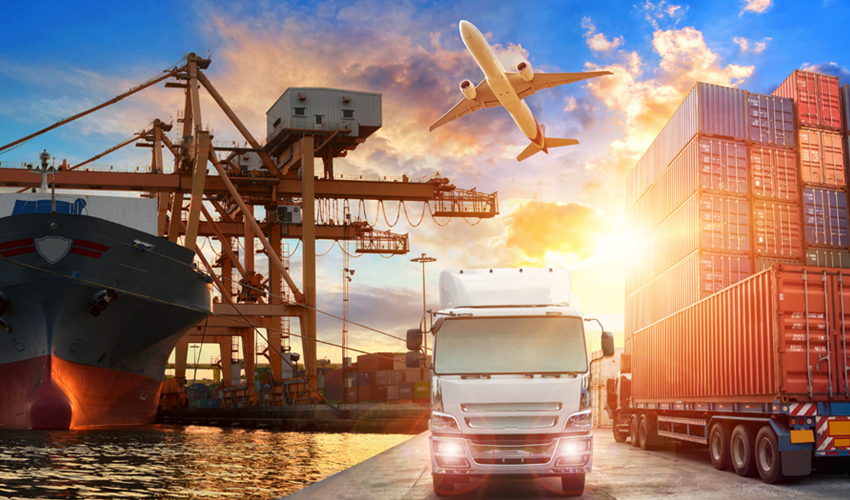

Some modes of transporting goods include the following:
- Truck transport: One of the most used ways to transport products, logistics companies usually offer truck transport in two ways: Truck Load (TL) – where the full truck contains one business’s consignment, and Less than Truck Load (LTL) – where one truck stocks more than one business’s products.
- Package carriers: Package carrier transport is when a logistics company carries packages ranging from small sizes to shipments weighing about 200-250 kg. These can be done via sea, air, rail, or land transport.
- Railways: Railways are a cheap and convenient way to transport goods. As they are competitively priced, they are an ideal option for large shipments that need to be moved over long distances.
- Waterways: These include transportation by ships and boats and are ideal for bulk products and consignments. (Example, containers, vehicles, heavy machinery).
- Air transport: As it is a costly mode of transport, air transport is ideal for small, time-sensitive packages.
- Intermodal transport: As logistics is a complicated process involving multiple modes of transportation, logistics companies operate all vectors across their network when moving goods from one place to another.
What role does a freight broker play in the transport of goods?


A freight broker acts as a liaison between businesses that need materials and goods shipped, and carriers that provide transportation. They do not own the goods or the assets that perform the logistics functions, but they are responsible for arranging shipments by optimizing and navigating the different interests and requirements of all the parties involved in the process. They align timings, packaging requirements, and special handling requests between manufacturers and transport carriers.
As freight brokers are typically non-asset-based service providers, they have flexibility in sourcing and utilizing the most efficient mode of transport for your shipping needs. What’s more, freight brokers work with multiple freight carriers, intermediaries, and partners to help businesses source the most reliable options. This relieves you from the taxing work of surveying the market, finding trustworthy, and cost-effective options. Not only does this save you precious time, but it also reduces the cost of transportation as a freight broker can find you the best deal.
What is the difference between a freight broker and a third-party logistics company?
A third-party logistics (3PL) provider is a company that provides an extensive suite of logistics and transportation services. Some of the functions that a 3PL can cover include freight shipment, tracking, distribution, warehousing, order fulfillment, and long-term supply chain management.
Similar to freight brokers, 3PLs can also function as intermediaries between shippers and carriers. However, whereas freight brokers provide an ad hoc service, 3PLs enter into long-term arrangements with a company and work to enhance a business’s supply chain functions for greater profitability and efficiency. When a business works with a 3PL for a longer period, the logistics company can gather more insightful knowledge about how you operate.
This information enables a 3PL to provide more customizable and effective solutions that meet the gaps in the underperforming areas of your organization’s supply chain. On account of the size of 3PL firms, as well as the nature of their work, they have wider networks with carriers and other intermediaries that ensure that their clients are paired with the most consistent and reliable solutions.
While freight brokers also function as intermediaries in the logistics chain, they differ from 3PLs by providing a limited range of services. Conversely, 3PLs work with their clients as partners and not subordinates. They operate by integrating logistics functions across core areas of business.
What are the advantages and disadvantages of hiring a third-party logistics company?


Due to the size and nature of their work, 3PLs have a broad network of carrier options. Depending on the requirements of your business, 3PLs can curate feasible solutions that are not only cost-effective but also streamline your supply chains. They can also help organizations like yours by arranging for storage, warehousing, packaging, and labeling of goods. As their area of expertise spans across all segments of the supply chain, they can provide more control through sharper inventory management during the movement of goods and materials.
The most important advantage of employing a 3PL is the intermediary’s long-term orientation. 3PLs build their brand equity by providing viable and future-focused solutions that help businesses improve efficiencies—meaning, a 3PL has a greater vested interest in the performance of its client’s business compared to a freight broker. As your business benefits from the services of a 3PL, it helps build a logistics company’s brand equity. This symbiotic relationship offers benefits to both parties involved.
However, with these advantages, there are also some disadvantages that businesses should be aware of before entering into an arrangement with an outside logistics and transportation provider. When working with a 3PL, you are likely to hand over some control of your product. This is because you have effectively outsourced its movement to a third-party. As a 3PL runs and manages storage and distribution, the client can’t exercise complete control over some important decisions regarding their product. Another thing to keep in mind about 3PLs is that they aren’t equipped for last-minute shipping. As they operate across established networks and supply chains, they are not very flexible when it comes to quick changes to routine functions.
Fourth-party logistics suppliers: the complete logistics supply chain solution
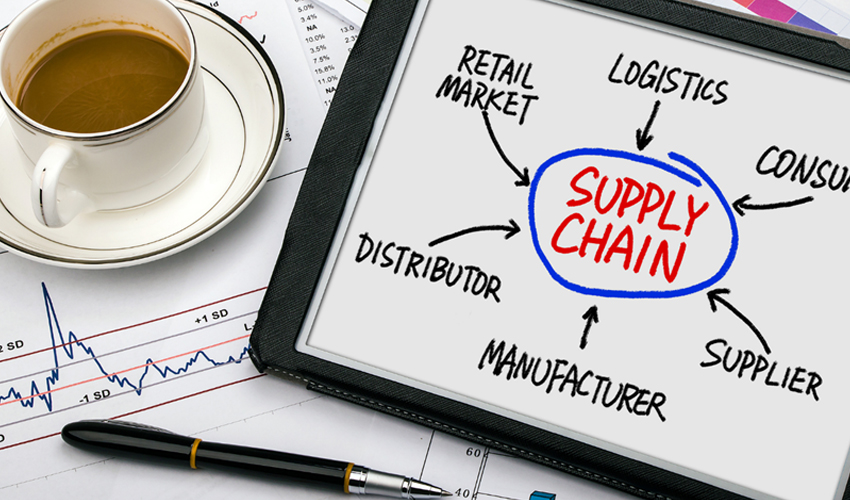

Fourth-party logistics companies (4PLs) are intermediaries that businesses employ for their logistics and transportation needs. Usually working with big organizations, 4PLs provide complete supply chain solutions from beginning to end. Depending on your requirements, both 3PLs and 4PLs can provide logistics support; however, 4PLs are generally better suited for medium-to-large businesses, while 3PLs are a better fit for smaller organizations. 3PLs focus on daily operations whereas 4PLs integrate across core operations within a business to optimize all logistics functions. They also own their assets like trucks and warehouses and can effectively coordinate the activities of third-party logistics providers. Generally speaking, 4PLs act as a single point of contact for every vendor across a business’s supply chain to provide the highest level of logistics services for greater value.
Conversely, 3PL firms are more focused on one-off transactions. They typically provide warehousing, packing, as well as inventory management of a client’s products and stock. With a third-party logistics company, you have more control of managerial decision-making. Your 3PL provider takes care of all your logistics and transportation needs under your name and brand.
4PL firms, on the other hand, manage the overall supply chain—from managerial decisions regarding operations, all the way to legal paperwork. This means that when a business enters into a contract with a 4PL firm, it signs over complete control of its entire supply chain. Following the formalization of the contract, the 4PL uses its resources and capital to ensure that it meets the supply chain needs of your business. How a 4PL achieves this goal is beyond the purview of the client, who no longer has total control over the operational aspects of their supply chain.
What are the functions of a logistics company?
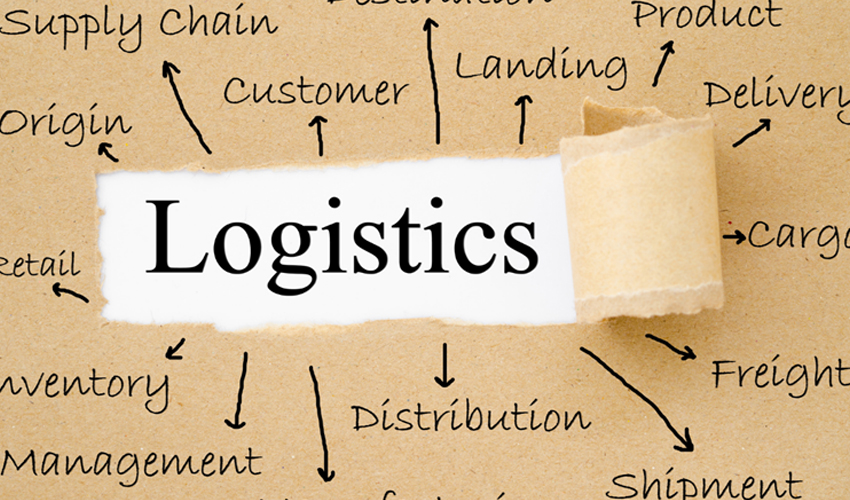

- Order management: Order management functions refer to the process of receiving, tracking, and fulfilling customers’ orders. This function is typically undertaken in-house by businesses. However, when a company is aiming to grow and expand, the paperwork required to manage inventories stocks becomes too much. They can outsource order management to a logistics company that is equipped to meet their needs.
An effective order management system organizes and streamlines everything to fulfill demand and meet customer expectations of timely goods delivery in great condition. Order management processes, therefore, involve tracking the entire journey of a product and addressing roadblocks as they occur. It also includes order handling whereby units of goods are picked, sorted, tracked, and shipped. Order processing can either be manual, such as handwritten order log sheets, or advanced technological and data-driven procedures that employ software and tracking. As a business scales, manual order processing needs to be replaced by more advance tech-based processes, such as those used by logistics companies.
- Materials handling logistics: The material handling function is tasked to the warehouse department within logistics companies. Warehousing services help businesses sort large volumes of products, which need to be organized and stored before distribution. As warehouses store thousands of units of products, misplaced or damaged goods not only cost money but also cause delays in order processing. Such delays can cause significant setbacks to a business. Trusting a reliable logistics company can reduce the chance of errors by streamlining stock management, inventory, packaging, and distribution procedures.
- Warehousing logistics: Businesses that deal in products that are in high demand need their manufacturing processes to be efficient and timely. When demand is high, manufacturing and order processing should be fast so that the market is not overtaken by your competitors. Warehouses play a vital role in such products. Apart from the warehousing function itself, the distance of the warehouse from the point of consumption also matters. If the distance between the warehouse and the distributor is too much, the order processing can get delayed and deliveries will ultimately be slowed down. Choosing the right warehouse can, therefore, determine your sales volume.
- Inventory control logistics: Inventory management is of utmost importance in logistics. More often than not, inventory management can be the determinant of a company’s profit. Experienced logistics companies can help businesses manage inventories by matching demand for a product and ensuring that the movement of goods is proportionate to timelines. By outsourcing inventory control, a business can scale up or down faster to meet demand. This helps negate wastage or losses for a firm.
- Transportation logistics: Transportation is the physical delivery of goods. It involves the movement of goods from a warehouse to a dealer and from the dealer to the end customer. Logistics companies are most widely used for their transportation functions. Freight shipments via air, sea, and land, form the largest segment of logistics and transportation. The proper transport of goods is essential to a business as a single mistake across the supply chain can adversely affect a company.
- Packaging logistics: Packaging is also an important component of the logistics chain. The correct kind of packaging protects products from damage in transport as well as moves goods safely and efficiently. Inadequate insulation and packing can cause damage to goods, and cost shippers and businesses money.
Key considerations before hiring a logistics company


One important factor to consider when outsourcing logistics is professional expertise. Not all logistics companies are specialists in every component of supply chain management. You should identify your business’s priorities and find a logistics company that best complements the functions and requirements of your organization.
Another thing to keep in mind is cost. Before entering into an arrangement, you must ascertain whether the logistics company’s pricing is transparent. Find out about hidden costs and evaluate whether or not the price being quoted is appropriate for the service offered.
Lastly, you must consider reliability. Companies with decades of experience in the field have brand equity that cannot be matched by newcomers. Especially when considering hiring a 3PL or 4PL, you must find a logistics firm that is reliable. Conduct background checks and carry out market research to get a clear picture of what a company has to offer.
SBT is a premium, market-leading transport, warehouse, and logistics company. For more information on how we can help you streamline your supply chain functions, get in touch with us.
SBT is a premium, market-leading transport, warehousing, and logistics company based in Saudi Arabia. Logistex functions as SBT’s main division—operating as a single point of coordination and providing logistics services across an expansive range of business needs.
With a strong and well-connected network, as well as over three decades of industry experience, Logistex provides import and export services, facilitates business supply chains, and supports logistics processes through non-core functions. The company’s integrated value chain contains components that any business—big or small—can benefit from. SBT’s expertise with e-commerce supply chains allows it to service small and medium enterprises just as well as larger corporations.
As an ISO, OHSAS, and SQAS-certified third-party logistics provider, Logistex is well equipped to deliver professional logistics services and solutions that businesses can trust. Our entire operational network ensures environmental safeguards and complies with international standards for carbon emission control and reporting. We seek to deliver excellence through the global integration of various logistics networks and a KPI-centric internal administrative view.
Working closely with clients to create, manage, and execute customized integrated solutions throughout the supply chain, Logistex is a dedicated provider of express transportation, as well as warehousing and distribution. Our wide range of logistics services includes port services, customs clearance, air freight, sea freight, and more.
The company’s suite of logistics services is discussed in more detail below:
-
Logistics services: Port service


Port services are a key component of an efficient logistics process. They include freight handling, nautical technical assistance, and other services relating to storage, domestic transport linkage, and transit.
Over the last decade, the volume of container throughput handled at Saudi ports has nearly doubled, due in large part to privatization, regulatory changes, and the wider use of high-tech equipment. The multitude of commercial activities that now takes place at ports within the Kingdom, as well as all over the world, requires experienced and professional logistics providers who are familiar with procedures and protocols.
Partnering with Logistex ensures that your business gets the right port services that mitigate disruptions, streamline docking procedures, and speed up permits and clearances.
-
Logistics services: Customs clearances
Customs clearance for goods is an important step in a business’s logistics procedures. It includes the preparation and submission of the relevant documents that are needed for the movement of goods to and from a country. Customs clearance work also involves representing the client during customs examinations, assessment of goods, payment of duties, and clearance of goods before delivery. After authorization by the authorities, the customs process requires the tracking of goods—especially sensitive or precious cargo across international boundaries. Various documentation and forms need to be filed for the transport of goods to be deemed legal. The process can often seem daunting, especially to new-to-market 3PL companies that lack the requisite logistics services and experience.
With years of regional familiarity, Logistex has built a network of contacts across both Saudi and the wider MENA region. Our professional guidance and assistance have helped multiple clients navigate custom clearance processes with ease.
-
Freight management logistics services


Businesses rely on the efficiency of their supply chains to deliver value to customers and to remain competitive in the market. Worrying about logistical inefficiencies should not be a paramount concern for any organization. Instead, time and resources should be invested toward growth and innovation.
This is why freight management logistics services are critically important to businesses. They ensure that the delivery of all kinds of cargo is timely, is routed to the correct destination cost-effectively and that the goods arrive commensurate with client expectations.
Effective freight management logistics services guarantee businesses smooth supply chains. By calculating time, transportation, and costs, Logistex can devise client-customized flow charts that take care of dispatch, procurement, and final delivery to a destination—making the entire process not only worry-free but quicker and more affordable on account of economies of scale. Through its freight management support functions, Logistex helps clients operate on leaner inventories and just-in-time manufacturing methodologies.
-
Logistic services facilitating import and export functions
Nowadays competition within industries is tight. If a company wants to distinguish itself in the market, it needs to not only produce quality products but also remain a financially viable choice at all times in customers’ minds. That’s why businesses are always looking for new ways to function where their supply chains are continuously being optimized.
This is where Logistex can help companies through their import-export functions. Trusting a reliable logistics service provider with transport and route options can help businesses grow significantly. As the number of goods to be carried on a daily, weekly, or monthly basis can greatly affect an organization’s bottom line, Logistex can create effective import-export systems that help ensure a company meets its customer demands, as well as controls inventory levels.
-
Air freight logistics services


When businesses require time-sensitive shipments to be delivered promptly, they opt for air freight. While air freight is one of the more costly methods of shipment, it enables safe and quick cargo transfers. Depending on the nature of goods, Logistex can provide:
- Consolidated air freight logistics services (i.e. multiple shipments on a single flight)
- Back-to-back or direct air freight logistics services (i.e. one shipment per flight)
- Chartered air freight logistics services (i.e. entire freight plane chartered for a single delivery)
By using Logistex, clients can expect two-to-three-day deliveries for goods—including the time required for custom clearance processes. Businesses can also explore air freight options for smaller deliveries where cost is charged on the weight of the shipment instead of volume. Moreover, with air freight logistic services the risk of damage/loss to product is greatly reduced. As Logistex’s air freight deliveries are easily tracked and quick to move, they are ideal for precious cargo, medicines, pharmaceuticals, and time-sensitive goods that need special handling and care.
-
Sea freight logistics services


When the price per shipment is a consideration for a business, it’s a good idea to consider sea freight as your ‘go-to’ choice for logistics. As air freight is an expensive option that comes with more paperwork and stricter border controls, some companies may be deterred by its restrictions. For example, for consolidated air freight, logistical services customers often have to wait until the flight is full, which can cause additional delays on cargo.
Conversely, sea freight is a more cost-effective shipping solution. 90% of consignments in the world are shipped via sea. Sea freight offers a considerably greater capacity for cargo as well as value, where costs per good are greatly reduced due to economies of scale. Additionally, as sea freight has a significantly smaller carbon footprint relative to air freight, it is a “greener” option for companies conscious of maintaining eco-friendly supply chains.
Within sea freight logistical services, businesses can avail one of four options:
- Full Container Load (FCL) logistics services: Depending on the volume of the goods that need to be shipped, businesses have an option to choose between FCL and Less than Container Load (LCL) logistics services. In FCL shipments, the entire capacity of a container belongs to a single shipper.
Clients can opt for Logistex’s FCL shipments when transporting larger loads. It’s a more cost-effective option when shipping more than 10 standard pallets or the cargo occupies more than 14 cubic meters. FCL logistics services offer more security as a single client has exclusive rights and control over a container. This increased protection ensures that there is no fear of contamination from other shippers’ products.
- Less than Container Load (LCL) logistics services: Conversely, LCL shipments are consolidated shipments, where more than a single shipper uses one container to deliver goods. LCL shipments are a good option for clients when shipments are smaller in number and size—they work particularly well for low-volume shipments of between two- and 13 cubic meters. Shipments with volumes less than two cubic meters may also be shipped with LCL, under certain circumstances. While LCL logistics services are a cheaper freight option, they can cause slight delays on shipments as containers need to be consolidated before they can sail. However, for businesses that are not under a time crunch and have budgetary constraints, LCLs are an ideal shipping option.
- Roll-on/Roll-off (RORO) logistics services: Logistex’s RORO ships are cargo ships designed to carry wheeled cargo, such as cars, trucks, semi-trailer trucks, trailers, and railroad cars, that are driven on and off the ship on their wheels or using a platform vehicle, such as a self-propelled modular transporter. Combined with air freight logistical support, Logistex can customize safe, reliable, cost-effective ways to ship wheeled cargo in and out of Saudi Arabia.
- Bulk shipping logistics services: Bulk shipping is when unpacked and loose shipments are loaded in bulk directly into the shipping vessel. The vessel itself acts as a container for the goods, which are quantified using mass or volume measurements.
The process of bulk shipping includes three steps: unloading, storage, and loading. When a bulk shipment is imported, it arrives at the destination port where it is unloaded from the vessel and transported to special storage facilities at that port. There, arrangements are made for its collection by the receiver or for transport inland.
Logistex provides bulk shipping options for solid bulk goods and liquid bulk goods. Solid bulk goods include grains such as wheat, rice, barley, and oats; minerals like bauxite, copper, and limestone; chemicals such as resins, pellets, plastic granules, and fertilizers; as well as other items like salt and wood. Liquid bulk goods include chemicals such as liquid nitrogen, natural gas, and petroleum; edible products such as cooking oil; and refrigerated goods like milk or fruit juice.
- Logistics services: Cargo shipments
Logistex also offers general cargo logistics services where shipments are packed as load units as opposed to loose-volume goods. Single goods are transported in packages or containers and the total shipment load is counted in units. General cargo is further divided into three categories:
- Breakbulk: Cargo carried in drums, bags, pallets, or boxes.
- Neo bulk: Cargo where each pre-packaged unit is counted. For example, lumber bundles, paper rolls, steel, and motor vehicles.
- Containerized: The cargo is carried in container load units. For example, door-to-door cargo services for domestic furniture, etc.
- Logistics services: Warehousing solutions


Warehousing is a crucial part of the supply chain. Businesses need proper storage of their goods to avoid inventory fluctuations and distribution delays, and to keep the cost of repairs and replacement low. Good warehousing logistics services are needed to provide safe, secure, and organized storage of goods so that they are easy to track.
As warehousing plays an important role in the customer experience, Logistex is conscious that proper management of goods is fundamental to a business’s success. We employ state-of-the-art digital warehouse management systems (WMS) to store items, as well as track their time of arrival, duration of stay, and quantity. By prioritizing operational excellence to include forecasting and management of labor and goods volume, Logistex ensures the implementation of all safety practices that meet regulatory compliance rules. By planning and managing distribution, we can record and track the movement of goods 24/7 from all inbound and outbound shipments to deliver logistics services that are consistently lower on costs and high on productivity.
- Logistics services: Freight forwarding


The freight forwarding process involves strategic logistics planning and implementation for the movement of goods on behalf of shippers. A freight forwarder conducts freight rate negotiations, container tracking, customs documentation, and freight consolidation, among other activities.
Logistex’s freight forwarding logistics services include acting as an intermediary between shippers to coordinate delivery of goods to the final destination using the transport modes that work best—i.e. such as sea/ocean freight, rail freight, road transport, and/or air freight.
Using our network of trusted contacts with carriers and partners from air transport specialists, trucking companies and transoceanic shipping lines, we can negotiate the best prices for our clients by optimizing routes, speeds, costs, and reliability.
- Facility management (FM), operations, and maintenance services
Over the last few decades, facilities management has become integral to logistics services for businesses that want to operate optimally. FM supports core business functions by creating an effective and efficient built environment where all occupants (human and goods) optimize the upstream and downstream movement of supply chains. By integrating and aligning non-core services that are necessary to operations, facilities management supports the completion of organizational objectives. Similarly, regular maintenance services that streamline logistics processes are vital for businesses to function. For example, streamlining loading/ docking bays and packing stations can help a business reduce waste and help its 3PL work more efficiently.
Using a combination of digitalization and automation functions, Logistex provides facility management services that can help organizations cut overhead costs from their supply chains and inventory management processes. We are well equipped to offer upkeep and repair of automated logistics-related processes and parts.
- Housekeeping


One frequently overlooked aspect of a business’s functions is inventory-related housekeeping. Logistex can offer both WMS advisory and execution for this ongoing process by aligning overlapping core business functions with 3PL support so that everything runs smoothly and promptly.
By providing housekeeping tasks, we can help reduce the maintenance costs that can reduce an organization’s profit margins. Regular monitoring of the dust and debris that affect the functionality of electronic equipment, implementing systemic cleaning, and using protective shielding, Logistex can help increase the life and durability of your business’s equipment.
- Logistics services advisory
In today’s rapidly evolving economic landscape, companies face lower barriers to entry than ever before. This means competition is a key concern for most firms. To rise above their competitors, businesses need effective supply chain management solutions from experts working in the field.
Logistex offers customized logistics services advisory and solutions. Utilizing our nuanced industry knowledge, our team of consultants can help businesses set up and maintain reliable supply chains that improve customer feedback, reduce operating costs, and improve a firm’s financial position. These advisory services can help managers curate and design a network that meets customer service goals, decreases purchasing and production costs, and gives them a competitive edge in the market.
- Camp Services


Our logistics services portfolio also includes camp services which can be used for functions like packaging, sealing, stamping and labeling of goods. We help clients design the infrastructure that best suits their needs and budget, creating efficient camp designs that bolster productivity and reduce costs. Included in the process are functions of planning, design, camp management, and close down.
For more information on how Logistex can offer businesses a unique opportunity to optimize their supply chains through a well-integrated system of logistics services, get in touch with us here.
SUMMARY
The Vision 2030 plan is driving huge investments and expansions across all sectors of economy. Logistics infrastructure is being primed for increased private sector participation, where new ports, airports, rail, and road networks are being established to expand reach and service within the Kingdom. Additionally, with new facilities like cargo terminals, custom-bonded zones and industrial clusters being set up to support the increased movement and warehousing of goods, new routes into European and Asian markets are being strengthened.
What’s more, as private and state-led companies continue to drive aggressive digitization processes across licensing, registration, passenger/cargo movement, and import and export financing, the entire sector is looking at boosted operational efficiencies.
This article highlights developments in the Saudi logistics sector so that you are aware of the changes that are turning the Kingdom into a global logistics hub of the future.
INDEX
Infrastructural developments positioning Saudi as a global logistics hub
Changing customs rules and regulations
A BRIGHT FUTURE FOR SAUDI LOGISTICS?
Heavy infrastructural investments across the Kingdom in line with Vision 2030 are fast changing Saudi’s global perception. Industry pundits believe the country to be the future gateway into the GCC.
This view is further strengthened after the recently held Future Investment Initiative summit where more than 140 headliners—including dignitaries, sitting presidents of countries and CEOs of global firms—met to talk about Saudi Arabia’s future. Amongst the many topics discussed at the conference, Crown Prince Mohammed Bin Salman’s announcement of accelerating investment into Riyadh, to help it become one of the top ten economic metropolis of the world, has further bolstered global confidence. The decision of 24 multinational companies—including heavyweights like PepsiCo, Schlumberger, Bechtel and Boston Scientific, among others—to establish regional headquarters in the capital further underlines an international buy-in into Saudi’s ambitious future.
What’s more, with government officials reiterating their commitment to cultivating trust with investment institutions to attract foreign funds into the country, there’s no denying that Saudi is on a route to aggressive expansion and progression. This commitment to move past Saudi’s oil credentials is seeing heavy investments to all sectors of the economy. The logistics sector, similarly, is seeing huge public and private capital spending on infrastructure to drive this agenda.
Listed below are areas of development in Saudi logistics that can help your organization charter a road map over the next few years.
Infrastructural developments positioning Saudi as a global logistics hub


All businesses need a smart logistics strategy where they are delivering the right products to the right customers at the right time at the least possible cost. You need a logistics provider that can serve as a single point of contact and is capable of managing all your logistic needs from start to finish. That’s why being aware of the strengths of your transportation, warehousing and shipping provider is imperative to your company’s success.
Saudi Arabia’s strategic geographic location at the intersection of Europe, Asia, and Africa opens up a host of logistics routes for businesses. You need to be aware of the logistics infrastructure within the country and its strengths so that you can plan the support you need for your enterprise.
Below we break down the sector by specialty and function.
- Transportation


The Saudi government has increased its budget for infrastructure and transportation significantly since 2017. It’s grown at a compounded annual growth rate (CAGR) of 12.5% through 2020. Despite the COVID-19 pandemic, infrastructure and transportation spending still outpaced pre-2019 levels. Take for example, in Q3 2020, SAR38.4 billion (USD 10.2 billion) was spent on infrastructure and transportation projects. It included the development of a new motorway under construction between Saudi Arabia and Oman to deliver lower lead times and trading costs. Even the railway sector is upgrading infrastructure through the expansion of five railway lines to facilitate the easier movement of goods and people. These projects include:
- A freight line between Dammam and Riyadh, via Abqaiq, Hofuf, Haradh and Al Kharj
- A passenger rail line linking Dammam with Riyadh, via Abqaiq and Hofuf
- The Dammam Port line which connects Hofuf with the Port of Dammam
- A new railway service between Riyadh and the Qassim
- A line to service Makkah and Medina from Jeddah
Similarly, the Saudi Land Bridge is slated to transform the local logistics sector, offering multimodal transport options between the two biggest ports on the west and east coast for the first time. It will be possible for mainliners to call in Jeddah, or King Abdullah Port just up the coast, and discharge cargo bound for Damman, Riyadh or any other city, without that cargo needing to transship through Jebel Ali in the UAE. Most importantly, the port masterplan takes into consideration a direct link to the Saudi Land-bridge Railway connecting the major cities of Saudi Arabia.
For businesses looking for expansive reach within the Kingdom, they need a logistics provider with not only an active transportation network but also warehousing and distribution services across multiple locations in the country. You want to ensure that your provider has requisite networks especially out of Riyadh, Jeddah and Dammam.
Their services suite should also include provisions for:
- Bulk transportation
- Full-truck load (FTL)
- Partial-truck load (LTL)
- Cross docking and distribution
- Container terminal operations
- Express transport
- Liquid and solid chemical transportation
- Door-to-door delivery
- Lowbed trucking
- Flatbed trucking
- ISO tanks
- Warehousing


Under Vision 2030, the transportation, storage, and communications sector has increased significantly from SAR129 billion (USD 34 billion) in 2013 to SAR164 billion (USD 44 billion) by 2019—increasing its GDP contribution from 5.5% to 6.2%.
Detailed below is the dry logistics market by segments:
Dry freight forwarding: In 2019, road logistics was the most prominent mode of freight in Saudi Arabia for dry logistics, followed by air, sea and rail. The country launched a new logistics zone open to private investors in the Red Sea port city of Jeddah in end 2019 to add to existing capabilities. The port currently serves as a major corridor to Asian and European markets where professional freight forwarding companies provide a range of niche services for clients. This includes logistics support across F&B, white goods, textile, furniture, machinery, engineering and industrial products.
Dry warehousing: The warehousing industry ecosystem is currently dominated by domestic companies, followed by international organizations. More players are slated to join the market. Construction materials and industrial-end users form the bulk of the clientele, followed by retail, healthcare, F&B, automotive and others.
While dry warehousing logistics suffered as projects within the Kingdom were put on hold, as of third quarter 2020, there was a bounce-back. Imports remained high and the value of non-oil exports returned to pre-COVID levels. In fact, by October 2020 the number of containers (TEUs) handled at Jeddah Islamic Port (JIP) had increased 5.5% from 3.7 million to 3.9 million. This was largely because of optimization of systems at port warehouses that allowed for a quick and efficient return to work as soon as markets opened.
Logistics value-added services:


The cities of Jeddah and Riyadh are the most populous cities in the Kingdom, with established industrially developed areas. Both cities drive the highest demand for built-to-suit automated warehouses and therefore, top the dry goods storage segment. In 2019, Jeddah dominated in terms of dry logistics revenue and in the value-added services segment that includes packaging, labelling, inventory management, cross docking, and door-to-door delivery.
While there’s no denying that the industry is largely fragmented with few players offering complete end-to-end logistics solutions, there are some 3PLs with the ability to provide nationwide services. They own their own trained workforce, as well as maintain direct asset ownership and IT support. They also have the structural and legislative trade experience to get past institutional restrictions.
If you are looking for 3PL support, you need to partner with a provider who has the requisite warehousing experience and facilities. They need to provide a suite of storage spaces, warehousing and distribution options across the major cities of the Kingdom—especially the metropolis cities of Riyadh, Jeddah, and Dammam. Additionally, all warehouses need to be temperature-controlled, dry, and dust-free zones that meet the specific requirements of a variety of goods. For pharma-related or livestock cold storage options, your 3PL should be able to deliver spiral cooling technologies that are capable of maintaining a consistent temperature across warehouses and transportation networks. Beyond cooling capabilities, certifications of storage compliance and security measures are also necessary. A provider who can process and appropriately store loose or palletized goods on shelves, racks, or in bulk in affordable multi-user facilities is an extra bonus.
The following services should also be included in a 3PLs value-added options:
- Cross-docking
- Inventory management
- Palletization
- Shrink-wrapping
- Segregation
- Inspection
- Order processing
- Empty pallet provision
- Labelling
- Freight logistics
As of 2019, Saudi Arabia had the biggest port network in the Middle East. It comprised of nine ports, with the government undertaking a multitude of large investments to further expand facilities. What’s more, new projects under the Saudi Rail-Road Expansion commission are supporting port infrastructure to further help improve supply chains along port to inland routes.
Sea logistics:
The Saudi ports network consists of nine total ports, of which six are commercial and three function as industrial ports—together handling more than 90% of Saudi Arabia’s trade.
The Saudi Ports Authority (Mawani) is the primary government entity overseeing port operations in the Kingdom. Throughput at Saudi ports has grown at a CAGR of 3.6% since 2013, reaching 289 million tons of cargo during 2019. The sector is witnessing substantial investments in infrastructure and capacity-building, including SAR1.6 billion (USD 427 million) in ongoing seaport construction projects. These projects include new cargo terminals, re-export zones, and a variety of public-private partnerships aimed at improving the efficiency of the Saudi port system. Mawani has also launched four new shipping lanes in 2020 to enhance direct import-export operations that broaden Saudi Arabia’s regional trade capacities. These new shipping lanes include:
- Direct shipping lane to East Africa through King Fahd Port in Yanbu and Jeddah Islamic Port.
- Shipping lane connecting Jordan’s Port of Aqaba and Egypt’s Port of Sokhna with Jeddah Islamic Port.
- Direct shipping lane to East Asia through Jubail Commercial Port, serving industrial companies in Jubail and Ras Al-Khair.
- Direct shipping line connecting UAE’s Jebel Ali Port and Egypt’s Port of Sokhna with Jeddah Islamic Port.
Of these, the Jeddah Islamic Port is the busiest commercial port in Saudi Arabia, handling more than SAR110 billion (USD 29.4 billion) of non-oil cargo during 2020. The King Fahd Industrial Ports, comprising Jubail Industrial and Yanbu Industrial Port, are the top industrial ports by total throughput. Jeddah Islamic Port handles about 60% of Saudi Arabia’s sea imports and serves as a strategic hub connecting global East-West cargo trade. Jubail and Yanbu Industrial Ports primarily handle liquid cargo such as crude oil, liquid gas, and petrochemicals.
Seaport developments:


In late 2019, Saudi Arabia announced the launch of the Al Khomra Logistics Zone just south of Jeddah Islamic Port. It will offer a customs bonded zone, re-export zones, and one million square meters to investors for leasing. Companies with a presence at the Al Khomra Logistics Zone will be able to provide primary and secondary manufacturing facilities, storage, and cooling facilities to clients.
Similarly, an estimated USD 750m is being spent on the King Abdulaziz Port in Dammam and over USD 70m is being spent on the Red Sea Gateway Terminal in Jeddah to raise logistics infrastructure.
A new King Abdullah Port—with boosted container-handling capabilities—is being built in Rabigh. It ranks as Saudi’s third largest import destination and one of the fastest growing ports in the world. During the COVID-19 pandemic, high-efficiency services and refrigerated storage facilities at the port made it a top receiver of pharmaceutical and medical supplies.
Additionally, the fact that in end 2020, leading international maritime shipping companies (Maersk and MSC Americas) chose King Abdullah Port as a logistics station on the Red Sea for two new shipping lanes comes as further endorsement of the port’s capabilities. Similarly, the addition of two berths at King Abdulaziz Port Dammam, one additional berth for container goods at Duba Port, and the first privately built and operated container terminal at Jeddah Islamic Port, Red Sea Gateway Terminal is enabling an increase in transshipments and re-exports.
Going forward, companies that can provide end-to-end logistics services to clients are slated to grow in handling capacities. They can act as a single interface between the customer and logistics provider to offer full transparency and visibility across freight forwarding, port and cargo services. By providing a “one party, one rate, and one liability” approach they take care of all end-to-end logistics—even ensuring that there is no dispute over invoicing. They are well placed to deliver smoother coordination between service providers, as well as reduce time delays and added expenditures.
Changing customs rules and regulations


Saudi’s logistics sector has long had a reputation for slower clearances and delayed processes. However, under the Vision 2030 program, the entire ecosystem is changing.
Listed below are recent amendments to customs rules and regulations that are making logistics functions within the country faster.
24-hour clearance program: The 24-hour clearance program was launched in late 2017 and has improved customs procedures, mechanisms, and their overall flexibility. By reducing the number of documents required for importing and exporting goods, more than 80% of all imported goods are now clearing customs within 24 hours. This is a huge improvement on the 7-to-14 days that was common practice previously. Similarly, average truck-stopover time has dropped down from 3 hours to 25 minutes and dwell time at ports has reduced from 14 days to 4 days.
Exemption from Arabic translations on manifests: Moreover, Saudi Customs now accepts manifests written in English without requiring their translation into Arabic and their subsequent authentication. What’s more, customs officials have also cancelled the penalties that were previously imposed on changing or updating these documents.
E-filing of documents: E-filing of documents has also significantly reduced the average time for customs clearances. Now vessels can file documents even before docking, helping move goods faster at ports.
Freeing of ship agency services: Similarly, the freeing of ship agency services from the previous restriction of being run by a hundred percent Saudi-owned company or by a Saudi national is one of many moves under Vision 2030 that is helping foreign businesses find a more confident footing in the country. While fuel supplying and customs clearance services are still exclusively Saudi owned enterprises, the announcement is going a long way to encourage foreign investors and raise standards in line with international practices.
Reduced handling fees: The ports sector is also benefitting from cost reductions across logistics. This includes lowered container handling fees, slashed original tariff rates for empty containers, and an overall decrease in the total cost for exporters by 53%.
As work on Vision 2030’s giga projects resumes with full gusto, in addition to the heavy movement of goods into the country, Saudi is also experiencing an influx of new businesses looking to establish direct regional headquarters in the Kingdom.
For new businesses coming into Saudi as well as those looking to streamline supply chains, you need to outsource logistics services if you hope to grow. A smart 3PL or 4PL can help you manage your import-export functions by providing optimized freight solutions and utilizing IT to ensure smooth data flow. What’s more, they are familiar with customs practices, and have international and nation-wide networks and infrastructure to deliver efficiencies.
To find out how SBT can help you set up smarter supply chains across the Kingdom, get in touch with us.
Since the implementation of restrictions from last year’s outbreak, the digital commerce sector within the GCC has grown exponentially, with many more people, previously isolating or in lockdown, continuing to turn to digital platforms to purchase products and services.
Increases in online sales in the final two quarters of last year saw many logistics companies in Saudi Arabia adapt in response to the surge in demand. The steep increase in sales saw logistics firms rapidly streamline their operations whilst continuing to assist suppliers by offering additional support and services.
As a result of the unprecedented growth, considerable investments have been made into the fledgling sector with investors aiming to develop the Saudi market and support local talent. As the market evolves, the sector continues to improve, achieving greater supply chain efficiency and further developing its digital payment capacity.
Under the issuance of the Saudi Arabian Monetary Authority (SAMA), initiatives like Fintech Saudi have supported the e-commerce sector in the Kingdom. The support has changed the way companies and individuals use and move money and has seen the number of Fintech firms offering services in the country jump from 19 in 2019, to around 60 as of early 2021.
Director of Fintech Saudi, Nejoud Al Mulaik, considers 2019 / 2020 to have been a pivotal period for e-commerce in Saudi Arabia. He says, “Despite the challenges of COVID-19, we have seen progression in regulations, infrastructure and an increasing number of investment rounds in fintech companies, which have built a solid foundation to support the emergence of a growing fintech industry in Saudi Arabia that will contribute in a meaningful way to Saudi Arabia’s Vision 2030”.
The Kingdoms digital commerce revenue, across all products, is on track to reach $9.41 billion by next year, growing from just over $6 billion in 2017. The KSA market offers significant growth potential to online retailers, with user penetration of the digital marketplace expected to reach 92.5% within the next 5 years. Electronic goods are the most commonly sought-after products online in Saudi, with online fashion retailers seeing marked increases in sales. Although user penetration is not as considerable as that of some of its neighbors, pandemic restrictions have inadvertently encouraged a change in the shopping habits of many in the Kingdom.
Despite the concept of e-groceries being largely at odds with mainstream Saudi tradition, sales online have more than doubled during the crisis. Coupling this with the Kingdom’s commitment to spurring growth, retailers have been quick to spot the ripening market and have acted accordingly, investing in developing digital sales channels and ramping up functioning capacity.
SUMMARY
Under the Vision 2030 plan, many sectors of the industry within the Kingdom are seeing huge investments and expansions. Like other areas, the logistics segment is being primed for increased private sector participation through the development of ports, airports, rail, and road infrastructures. New facilities like cargo terminals, custom-bonded zones, and industrial clusters are being established to support increased movement and warehousing of goods. These new infrastructural developments are further facilitated by enhanced airport and seaport capabilities. Additionally, with private and state-led companies driving aggressive digitization processes across licensing, registration, passenger/cargo movement, import and export financing, as well as incorporating the internet of things (IoT), the entire sector is looking at boosted operational efficiencies.
The fact is that Saudi Arabia is poised to become the dominant logistics giant in the region. Businesses that are looking to expand reach and service, enter new territories or even consolidate existing shipping routes so that they are more resilient to disruptions like the COVID-19 pandemic, need to consider how the right kind of logistics functions can help them grow.
This article highlights new logistics infrastructural developments in Saudi that can be beneficial to your organization.
INDEX
HOW THE RIGHT LOGISTICS CAN OPEN UP NEW BUSINESS AVENUES
Digital access has globalized commerce, meaning that even the smallest of organizations can now have an international outlook. This means that businesses in any part of the world can source materials from anywhere as well as offer services and products to anyone. Today, any organization can set up any kind of supply chain—all they need is the right kind of logistics support.
Within the Kingdom, the logistics sector is on a path toward exponential growth. With huge infrastructural investments underway across many parts of Saudi, small-to-medium enterprises, as well as larger organizations, are now better placed to compete on the world stage.
So, how do they do this?
Get your logistics right
All businesses need a smart logistics strategy where they deliver the right products to the right customers at the right time at the least possible cost. The fact of the matter is that shipping and logistics can be the difference between a small business thriving and failing. But with so many different facets to take into consideration, it can be a challenging prospect. Here are some ways to do it:
- Simplify your supply chains


One lesson the year 2020 has taught all businesses is that they are only as strong as their supply chains. But even in normal business cycles, no matter what size or in which sector, the setup and management of your supply chains is fundamental to achieving smooth business logistics—more particularly when shipping overseas.
Why it’s important? Saudi Arabia’s strategic geographical position places it in close proximity to multiple global markets. Most European consumers are less than a seven-hour flight away, while Asian markets are generally just a four-hour plane journey from the Kingdom. Regional markets consisting of more than 3.5 billion potential customers over three continents are within a five-hour flying distance. Saudi’s central location also provides it with a cost advantage in the Arabian Peninsula, North Africa, and East Africa. Businesses in the Kingdom, therefore, are perfectly placed to tap into many potential markets.
However, even with such close proximity, the pandemic has irrevocably shown that all supply chains can be halted, putting not only organizations but entire economies at risk. It makes sense to note that during the first nine months of 2020, the government invested over USD 10 billion on infrastructure and transportation projects to facilitate the easy movement of goods. They also built infrastructural, warehousing, and storage capacities at ports and logistics hubs so that there were no lapses in supply chains. These moves are not only to build Saudi as the regional logistics hub in the coming years but also work as insurance to mitigate future disruptions so that the Kingdom stands more resilient to changes.
How to do this? All businesses need to start by analyzing a clear supply chain process where they break down each stage of the operation from order confirmation through to product picking, packaging, and shipping. The nuances of each stage need to be worked out across a realistic timeline that streamlines processes, without compromising on safety or efficiency. It’s also prudent to invest in supply chain management software that unifies the entire process and allows you to manage everything in real-time and with real data. This gives you greater transparency from an administrative perspective. Additionally, on-ground data provides valuable information for further optimization of supply chains.


Using the right logistical support:


In cases where supply chain management forms a large part of internal operations, in-house logistics and warehousing may offer greater control and transparency. However, the same does not hold true for smaller enterprises—especially if they are looking to lowering costs, benefit from economies of scale, or expand into newer territories.
Organizations like these need to make room for collaboration, using multiple logistics processes that are bifurcated based on geography. And while they still need to ensure that they’re meeting deadlines and turning in quality products, they need to lean on external functions and support to eliminate silos along the supply chain.
One way to do this efficiently is to outsource logistics functions so that you boost holistic supply chain management. Third or fourth-party logistics providers (3PLs/4PLs) are better placed to work with all stakeholders to develop a roadmap for consistent, continuous, and collaborative movement along the supply chain. What’s more, because logistics companies are constantly upgrading manual systems to automated ones, they can automate logistics processes (including tracking and monitoring) to keep more ‘eyes’ on each delivery.
These systems take the guesswork out of planning your supply chain as they report raw data without bias to ensure that your business is better informed. By using information from 3PL and 4PL fleet and inventory management software you have more visibility of the cost of logistics per article. This allows you to further refine your processes around the factors that impact your bottom line the most.
Areas of growth within the Kingdom:
Saudi Arabia is already a hotbed of development and activity on account of the industrial and construction growth ongoing in the Kingdom. Existing supply chains are expanding to handle the larger movement of goods.
Ninety kilometers from Jeddah, the King Abdullah Port is a full-service commercial port that enjoys strategic access to the Red Sea, as well as countless markets and destinations in Asia, Africa, and Europe. In fact, an estimated 26% of global trade passes through the Red Sea. As the eighth fastest-growing seaport in the world as of 2017, the King Abdullah Port has undergone further infrastructural improvements.
Facilities at the port include multipurpose terminals for containers, roll-on/roll-off and breakbulk, and general cargo. Logistics services also include a Logistics Park within the port premises of more than 750,000 square meters and a bonded zone adjacent to the port of more than 3.3 million square meters. This opens up a host of warehousing possibilities on port before shipping. Even more importantly, the port master plan takes into consideration a direct link to the Saudi Land-bridge Railway, connecting the major cities of Saudi Arabia.
For businesses looking to expand, the port and its supporting channels allow for increased integration of supply chains comparable to hubs like Khorfakkan and Jebel Ali. Similarly, the Saudi, UAE and Omani governments investing around USD 350 billion in rail and port infrastructure over the next four years shows a commitment towards opening more regional routes for logistics collaboration.
If you are a business that is keen to expand into these areas, you need to work with established logistics providers—organizations that can take full advantage of these pathways and facilities.
- Optimize warehousing


Warehousing is an important part of a business’s logistics management system. It provides storage for finished goods and includes the packing and shipping of orders. Efficient warehousing not only provides economic benefits to a business but also optimizes processing and logistics.
Why it’s important? The fact of the matter is that shipping has become the number-one cost in fulfillment and requires constant review and changes to keep finances in line. It goes without saying, therefore, that as the backbone of any supply chain, optimizing your warehouse goes hand-in-hand with mastering supply chain logistics.
Smart warehousing isn’t just about making operations faster, but rather, it requires continual analysis of day-to-day operations like stocking, labor movement, packaging, and labeling to ensure that everything is working as efficiently and safely as possible.
For most multichannel businesses, inventory is the most important balance sheet asset. Therefore, the function of slotting and location control is essential in helping you track products within the warehouse’s four walls, as well as meet your client-fulfillment needs. But not all businesses and organizations can maintain private warehouses—there are increasing rent prices, fluctuating demand-and-supply cycles, labor costs, and pricing and packaging, amongst other considerations.
How to do this? More than half of the warehousing function is controlling inbound and outbound freight. If this is not done right chances are that you’re constantly suffering from poor management of inventory and eroding a line off of your profit margin. What’s more, as more than 50% of your warehouse labor function is to pick and pack, you need to weigh productivity against cost. It’s a smart idea to consider product flow and order flow, where a rule of thumb you can always test against is fewer steps = fewer touches = lower costs.
The fact is that SMEs operate differently from larger organizations, but all organizations want operational improvements that reduce costs. To do this, you need smarter warehousing and inventory management. You need to ensure that:
- Your storage systems are appropriate for the stock being stored and picked.
- You aren’t being forced to double handle or search for items.
- You aren’t spending too much time on tasks like walking and looking rather than picking and packing.
- You have the right labor and management support.
- You have the right warehouse management systems and digital processes in place that are monitoring fulfillment and every step of the supply chain.
The truth is that to get the above-mentioned things done correctly, you need to make huge investments in time, money, and training—things that are not easily available to growing organizations. That is why a lot of businesses lean on 3PLs for warehousing support so that they can professionally meet their businesses’ critical KPIs.
Using the right logistical support: While a lot of enterprises may prefer to keep warehousing internal, as function and geographical reach grow, it makes sense to outsource. Leaning on external capabilities to make use of gathered data to identify order trends (for example, identifying top sellers, items frequently ordered together or seasonal trends), can help a business like yours benefit from professional vendor experience in smarter warehouse layouts, or in executing fulfillment quicker and at lowered costs.
3PL providers can make faster changes to supply chains—including scheduling inbound purchase orders to manage the receiving dock/yard better. Similarly, they can handle compliance policies (including purchasing terms and conditions), on-time delivery, quality, item specifications, routing and importing guides, and product packaging and labeling faster and more efficiently so that there are no mistakes. With the right support, you meet client fulfillment better, which in turn, helps your business grow.
Areas of growth within the Kingdom:


The warehousing market in the Kingdom is expected to further grow at a 9% CAGR to reach a market size of SAR 15.75 billion by the end of 2020. Growth in this segment is expected as a result of increased manufacturing activity, growing international trade, rising domestic consumption, and the easing of government regulations. Partnering with a professional vendor puts you in a better position to avail this new infrastructure.
- Cold Chain Warehousing: Post the 2020 Covid-19 pandemic, the cold chain market in the Kingdom particularly is being driven by rising demand for dairy, meat, and pharmaceuticals on account of not only the growing number of modern grocery retail stores in the country but also concerns about food availability and supplies.
It pays to keep in mind that Saudi Arabia is one of the largest consumers of meat and seafood in the world and the largest consumer of red meat in the GCC region. It also produces a considerable amount of meat along with importing a majority of it. Cold chain warehousing, therefore, is very important for businesses that require complete end-to-end cold 3PL logistics and supply chain management. You need to ensure that you are outsourcing to vendors who have the right HACCP-certified cold and chiller storage facilities, as well as transport trucks that are reliable and meet all safety and hygiene standards.
Currently, Riyadh accounts for the highest number of cold storage warehouses. The city acts as a hub from which products are transported to other regions of the country. Jeddah has the second-highest share, followed by Dammam. A few cold chain warehouses also operate in Mecca and Medina due to the large number of pilgrims visiting the cities during Hajj. For companies looking for cold chain warehousing solutions, they need to ensure that they are partnering with the right kind of support.
- Prioritize packaging


While most businesses may not consider packaging an important aspect of logistics, the right kind of packing can make a big difference in how you meet your fulfillment orders.
Why it’s important? Low-quality materials or insufficient packaging can result in goods being damaged or broken in transit. Certainly, if you’re venturing into overseas shipping, the choice of packaging needs to be robust to withstand longer and often more turbulent transit to guarantee shipments arrive intact.
How to do this? Source a reliable packaging supplier and opt for hardwearing and durable solutions. While the initial outlay may be more, the expense of returned goods and bad customer feedback could be costlier to your business. What’s more, if you go with a professional vendor, you can benefit from bulk buying at wholesale prices.
Using the right logistical support: For most businesses, the area of expertise is their product, not how to get it from one place to another. Most businesses outsource some function of packaging to an outside vendor. The idea is to ensure that as a business you aren’t being wasteful and that it is not affecting your productivity or your costs. Outsourcing to a 3PL vendor means they will take time to find the optimum packaging solution that will provide suitable protection and security for products, as well as minimize waste.
Areas of growth within the Kingdom: With a growing urban, educated, and aware population, Saudis are demanding more from their products in every way. This also includes increased conscientiousness about the environment. With a Vision 2030 mandate to lower the Kingdom’s carbon footprint, the benefit of partnering with a professional logistics vendor means that they know how to get the job done in a way that is ‘greener’ and friendlier for the planet.
To find out how the right logistics can help open up new avenues for growth in Saudi and abroad, get in touch with us here.
Saudi Arabia’s businesses resume hiring as economy records gains.
2020 proved to be anything but business as usual. It was a year that saw unprecedented challenges as GCC states adapted to the fallout of the global pandemic. Within the Kingdom, the results of decisive measures taken early on in the crisis are starting to show. Green shoots of recovery are beginning to emerge, with confidence in Saudi Arabian businesses rising to levels not seen since January 2020.
With improvements in output and orders, businesses can take some comfort in the turnaround. After a difficult year brought about by the spread of COVID-19, employment figures have also made a welcome return to growth, reassuring policy-makers that the economy is heading in the right direction.
PMI Reading.
Bolstered by output and new business growth, Saudi Arabia’s PMI Purchasing Managers’ Index saw a consistent monthly rise throughout the last quarter of 2020. With anything in the index over 50 points signifying a positive trend, the index has registered above the 50.0 no-change mark for three months in a row, highlighting a sustained economic recovery and a strong end to the year for the non-oil private sector.
Continued public spending coupled with an improving health situation could nudge growth higher, with index points expected to climb in 2021.
Getting back to work.
Encouraged by the easing of lockdown measures, in addition to the arrival of the vaccine, some businesses have spoken of concerted efforts to raise inventories and increase private sector investment in anticipation of a quickened uptick in 2021.
Government-led stimulus and relief efforts have seen encouraging results, notably with a rise in employment and acute demand growth. Recent Labour Reform initiatives strive to further develop local job markets and create a pool of highly skilled talent.
At the virtual G20 Summit, King Salman bin Abdulaziz Al Saud sought to stress the importance of job protection and support for labor markets throughout the COVID-19 crisis and beyond. Hosted from Riyadh, participating leaders and invited guests were presented with the theme of Realizing Opportunities of the 21st Century for All.
Building on Vision 2030’s blueprint to launch new growth sectors, Saudi Arabia is expected to see increased global investment across a significantly broader economic base. The next generation of Saudi youth will be offered the opportunities and equipped with the skills to help them realize their individual potential.
Businesses around the world will be hoping that 2021 will see a year of beneficial transformation and rapid recovery. Engineering a significant rebound will require much more than a vaccine. However, the bold steps taken by policymakers within the Kingdom are sure to set the Saudi economy on the right path and in good shape for achieving its 2030 Vision.
SUMMARY
Running an SME is not easy. You constantly need to balance customer demand for stability and agility against material sourcing and vendor reliability.
On its own the job is tough enough but coupled with the global disruptions brought about by the COVID-19 pandemic, it’s become even more difficult for businesses to operate.
It’s a good idea for organizations like yours to reevaluate priorities for the coming year. Whether you are considering expanding your enterprise versus directing your efforts towards consolidation, or evaluating what services can be easily insourced versus where you need more external third-party support, you need to view your business’s pain points for a holistic picture.
This article will help you evaluate where your organization stands at the end of 2020 so that you can draw an informed business plan for next year.
INDEX
IS 2021 A GOOD TIME TO SCALE YOUR BUSINESS?
Even before the COVID-19 pandemic threw economies for a loop, the logistics sector was gearing up for a year of transformation to meet the ever-increasing demands placed on them by businesses who sought 3PL and 4PL support. But 2020 changed the script altogether. The year saw many businesses fold and from those that survived, many moved online. Even with the disruptions brought about by the pandemic, customer requirements for shorter package delivery timeframes remained high. To survive, many companies had to rethink operating models.
Heading into 2021, manufacturer and retailer businesses consolidating or scaling, need better, faster, and cheaper ways to meet their supply chain requirements. You need additional agility and transparency that can help you increase or reduced production to meet demand as needed. Without the right kind of support, you will not be able to adapt fast enough, while leaving room for constant re-evaluation and revision of the status quo.
It pays, therefore, to have a strategy on how to move forward.
It’s alarming to find out that even when the world is operating under ‘business as usual’, 50% of companies function without a business plan. As businesses and economies reel from the second wave of the pandemic, it’s more important than ever before that organizations like yours set targets for themselves, in order to weather the storm over the next few years before they plan a return to profitability.


Constructing a business plan for 2021
Lockdowns and social distancing measures have changed the way consumers shop, forcing businesses to upgrade digital infrastructures. Within the Kingdom, a rise in urban population, education, and incomes is bringing about a shift in consumer behavior. In fact, according to a 2020 Mastercard study, nearly 77% of Saudi consumers have shopped online during the pandemic. With the government still significantly investing from the top down over the next decade, businesses wanting to tap into the country’s young growing population need to start meeting fulfillment requirements in a smarter way if they want to remain profitable.
It makes sense, therefore, for companies like yours to be aware of consumer trends, so that you can strategically plan your 2021 business goals:
- Delivery services: Delivery services have become the new normal through 2020 and are expected to stay for the foreseeable future. While brick-and-mortar stores continue to register low footfall, businesses that hope to continue operating have to consider smart logistics partnerships—especially with last-mile delivery providers, so that they can leverage their physical stores to fulfill locally placed online orders. Businesses that can provide customers with easier, faster, and reliable delivery options will come out stronger in 2021.
- Consider alternative business models: Brands are pivoting away from the traditional concept of aisles and fully stocked shelves. For the next couple of years, physical stores can’t be considered the final destination in the purchase journey. As organizations upgrade to digital retail models, they also need to consider payment methodologies that provide customers with value-over-time, subscription-based purchasing options.
- Reevaluate the role of fulfillment hubs: As leased storefronts underperform due to a lack of visitors, SMEs are expecting a change in how consumers interact with traditional stores. Businesses will need to reinvent themselves for more experiential interactions, and failing that, will have to lean in aggressively on logistics support that can fulfill customer orders. Retailers, especially, need to actively look towards storage and fulfillment hubs that can store, stock, and meet order requirements.


Your business’s pain points and solutions
No business can come up with goals for itself without identifying its pain points and weaknesses. Whether you are looking to consolidate or grow, you need to consider the ramifications of the COVID-19 pandemic to your business. Even with a vaccine on the horizon, the disruptions from this year are expected to be felt across industries for a while. It pays, therefore, to plan for contingencies. Below are some suggestions:


- Issues with supply chains: It’s no secret that when it comes to supply chain management and access to material suppliers, small businesses are not placed in a position of power. Small businesses stand to get negatively impacted by the competition when bigger players, who exert more influence through larger orders and bulk rates, are also sourcing from the same places. Similarly, smaller enterprises are faced with repeat problems when they are selling their products or services on credit terms. With additional supply chain disruptions and delays arising from the COVID-19 pandemic, it is very hard for small enterprises to maintain undisturbed supply chains. Without guaranteed material sourcing it will be impossible for your business to run regularly.
Solution: Supply chain resilience
Logistics companies are well placed to diversify supply chain routes for clients. This is a crucial support for business continuity. As a small business, you may currently be reliant on single sourcing routes as it secures you quick materials or meets your cost targets. However, one thing the pandemic has taught business owners is that they need to shift towards building more varied supply chains through geographic diversification and stricter vetting of suppliers and vendors—especially now as countries are reopening economies.
Third-party logistics support can exert more pressure on suppliers. They are also well placed to provide 24/7 monitoring of supply chains, purchasing insurance to cover profits lost from a disruptive event at a critical supplier’s site, and asking sole-source suppliers to build and store parts at alternate sites. With their multiple-sourcing processes in place, they can shift faster to alternative solutions and are better placed to support your business through future disruptions like the 2020 pandemic.


- Customer retention:
For any business to stay alive and profit they need customers and repeat orders. However, for most businesses, the level of demand fluctuates. Predicting how much is needed in normal circumstances is hard enough, but the current crisis, in particular, has made it extra hard for businesses to gauge when markets will open to drive increased demand. Yet at the same time, no business wants to refuse customers—especially now when client retention is a huge struggle. So, when an order is made, you want to ensure you deliver—but ‘how’, remains a challenge.
Solution: Increased collaboration and connectivity


One fact remains true across any organization: happy customers give repeat business. At a time when you are balancing costs, cutting out inhouse logistics functions can come as a huge saving. But you want to do this while ensuring that you continue to deliver on quality for clients. The best way to maintain optimal service is by focusing on the jobs you are good at and outsourcing logistics support to the professionals who do it as a business.
If you are dealing with limited space and aging infrastructure, you may not have enough space to house large inventories and an increasing number of packages. Partnering with freight carriers who offer warehousing facilities can greatly help you scale production up or down to meet demand. What’s more, warehouse employees are trained to review inventories for stricter supply chain management. This can help 52% of smaller businesses who state that poor quality employees are one of their biggest challenges.
Additionally, logistics companies connect with other providers to achieve shared success. Partnering with a third-party logistics company can give businesses increased connectivity with transportation and distribution assets to quickly pivot to respond to current needs. They can also deliver more efficiently to keep clients satisfied and returning to your business for more purchases.
- Updating customers through the delivery process:
Automation and digital processes are adding transparency to supply chains. But not all businesses are financially secure to make a sizable investment towards upgrading functions. When it comes to product deliveries, clients expect a real-time response where they are interacting with the vendor about the status of their order. This update becomes even more critical in times of crisis. Businesses that cannot provide this level of visibility and trackability across their processes will not be able to compete.
Solution: Mobile-first strategy
A recent study states that around 66% of millennials expect a real-time response and are looking for the opportunity to interact with vendors about the status of their orders. With almost 70% of the Kingdom’s population under 30 years of age and 28.8 million cell phones as of 2019, it makes sense for businesses to allow trackability on the status of purchases right in their customers’ hands. Moreover, with more people in 2020 purchasing online due to safety concerns related to COVID-19, same-day deliveries and last-minute delivery have become the baseline for client expectations. On the downside, these are also the most inefficient processes in the supply chain. To be able to manage time-sensitive demands efficiently, you need to be using mobile tools to make faster fulfillment possible. Partnering with logistics providers who already have the necessary infrastructure in place can help you keep pace with client needs by tapping into your 3PLs resources.
- Lack of storage facilities:
On account of the pandemic, businesses are witnessing reduced footfall in-store. Not everyone could transition online fast enough, and consequently, profits have shrunk. If you are an organization that is trying to cut costs you can no longer afford to maintain stocks in private warehouses at exorbitant rents. Simultaneously, the 2020 pandemic has also highlighted issues with raw materials sourcing. Smart businesses want to maintain a minimum stock of supplies, without wasting space—so, how do they do that?


Solution 01: Warehousing support
Not only do logistics providers have warehouse infrastructures, but they also run smart warehouse management systems that can offer clients inventory visibility, optimization, and automation of warehousing processes. Their warehousing and distribution solutions, such as labor and staffing optimization, can greatly benefit your business as you don’t have to worry about storage space for any kind of cargo. Your logistics partner can meet the demands of your business and scale offerings up or down as per your requirement.
Solution 02: Increased efficiency through automation
Another advantage of outsourcing warehousing is the way these facilities can improve performance through a technology-heavy approach. Logistics companies use automation to streamline storage areas or classical transaction-based ERP systems that can greatly increase your flexibility—particularly the kind of short-notice flexibility most businesses are facing right now while still reacting to the pandemic. You need the breathing space that comes from these margins as you work your way through 2021.
Moreover, logistics companies are well placed to introduce industry-leading digitalization processes to their businesses. Automation through robotic systems enables quicker, more efficient item picking—for example for online grocery order fulfillment. Rather than investing heavily in your own capabilities, partnering with the right logistics provider can help you consolidate your business while the global environment settles down.
- Last-mile delivery:
With strict distancing measures still in effect, there are restrictions on movement and delivery. You may have managed to move sales online, but there is still the matter of collecting payments and delivering products locally, nationally, or regionally on time and in a safe manner. Similarly, for returns on orders, you need processes that track payment returns and freight logistics. Not every SME has inbuilt capabilities to manage these functions.
Solution: Third-party logistic support
Most 3PL service providers have operating systems and sufficient manpower already in place. Through repeat business with other companies like yours, they have streamlined procedures for optimal execution. They can process thousands of bills and audit them appropriately within a short period of time. They have also established safety strategies that deliver a better and safer retail experience for your clients. As they already have back-office staff working with invoicing, carrier vetting processes, etc., they can take care of all coordination and communication between carriers to deliver to a destination. With accounting mechanisms already at hand, they can also take care of invoicing for you, as well as handle returns. This becomes all the more important at a time when customers are trying to reduce human-to-human contact but are still demanding timely transactions and deliveries. Third-party logistics support can greatly help streamline these processes for increased customer satisfaction.


A change of focus
The global pandemic has brought into sharp focus issues relating to ethics and sustainability. Increasing numbers of customers are interested in the fine-grain details on how their products are made, who they are made by, and the impact at each point in the supply chain.
With a younger, more informed, and aware population in Saudi on the rise, these questions are increasingly directing businesses like yours to rethink how you produce and deliver your goods. As you plan for the future you may consider moving away from a linear supply chain model towards a circular economy. Simply put, this means the product doesn’t end with the consumer but is instead re-used to conserve environmental resources.
As consumers are driving the circular economy, which focuses on promoting access and processing end-of-life materials, you need to be rethinking business strategies that:
- Lower volume orders and stagger delivery
- Deliver more “product as service” models to reduce landfill contribution
- Provide raw material security for both products and packaging
- Plan for returned supply after customer purchase or consumption
Going forward, you need to be partnering with logistics support that reflects the same values. You may want to work in post-purchase recycling logistics and reusing supply chain tools and materials to reflect a more conscientious business model. As consumers become more aware of the impact of their choices, focusing on ethics and sustainability is not just good for the planet, it’s smart business!
Ultimately, business projections for 2021, and well into 2022, require you to focus on flexibility and technology, and on employing them in smart ways to quickly ramp up or down to meet the unusual rapidity of market changes. At the core, creativity will matter—as will the companies you choose to support your efforts. Logistics providers with the right infrastructure—for example, with offsite storage options and flexible delivery schedules, can ensure any fluctuation in stock or other business needs can be easily handled, no matter how little physical storage space is available.
Companies that invest in their supply chain management processes through the right kind of logistics support right now may stand poised for greater success in the future.
For help on formulating a logistics-support business plan for 2021, get in touch with us here.
Strategically located between three continents, Jeddah Islamic Port serves one of the world’s busiest shipping routes and acts as the gateway to the Middle East and its growing economies.
As part of the Kingdom’s ambitious Vision 2030 plans, there has been a real determination to thoroughly modernize the country’s shipping and logistics sector, and capitalize on the countries unique position as the gateway between east and west. As the most important port in the Kingdom, Jeddah Islamic Port has undertaken a series of measures to help establish itself as the regional hub of innovation, speed, and ease of doing business.
An important development within Jeddah Islamic Port has been the one million square kilometer logistics zone, LogiPoint. The zone, which is the largest bonded and re-export zone in the Kingdom is playing an important role in increasing the speed and effectiveness of logistics within the port.
Over the past few years, 3 initiatives, in particular, have helped the port reach new levels of efficiency and boosted the ease of doing business:
Bonded Express Facility
The adoption of e-commerce in the Middle East took longer to catch on than expected. But with some major players entering the market, and the COVID-19 pandemic having expediated the region’s acceptance of online shopping, the Bonded Express Facility has played an important role in expediting the process of moving goods through the port, so important for achieving e-commerce success.
The Bonded Express facility, through an intelligent mixture of policies, processes, and infrastructure, is able to handle inbound and outbound express shipments by air, land, and sea. This has allowed e-retailers to target the Saudi market and the larger GCC market through the port.
Cross-border speed
Typically, ships transiting through the Red Sea from Europe and the Americas would have a further 8 – 12 days of journey time ahead of them to reach other GCC ports from Jeddah. The LogiPoint logistics zone introduced the cross-border Gulf service which allows shipments to be unloaded in Jeddah and moved onto their final destination in other GCC countries through bonded trucking. This has reduced transit times by 7 – 10 days.
Sea to air and air to sea
Another important addition to the logistics zone has been the work done by stakeholders and regulatory bodies to connect the logistics process. It is now possible to import one leg via sea, move it to an airport via bond, and send it out to its final destination by air. The same thing can now be done if the first leg of the journey is by air, with the shipment reaching its final destination by sea.
The syncing up of various logistics transport methods through Jeddah’s logistics zone has been an important part of creating a fluent, multifaceted logistics destination for local and international businesses alike.
